
Strained Relationships: Wilfrid Brambell & Harry H Corbett
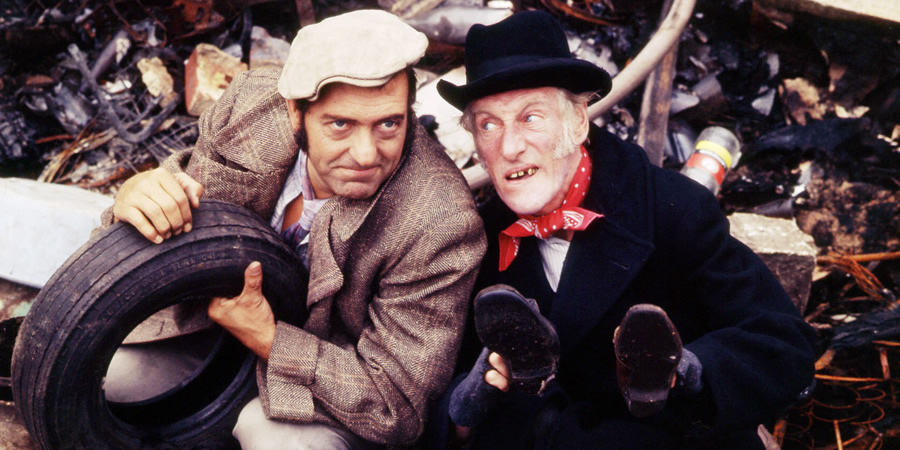
Sitcom relationships can often be difficult, but, when the sitcom is exceptionally successful, such difficulties can be exaggerated to the point of becoming misleadingly mythical. A case in point is the off-screen partnership that powered the on-screen appeal of Steptoe And Son.
Here is a classic sitcom that is often depicted as the classic example of the dysfunctional starring relationship, the show with the chronic battle behind the scenes. The truth, however, is far more complicated than that.
Co-starring Wilfrid Brambell as Albert, the crude and cynical rag-and-bone man father, and Harry H. Corbett as Harold, his deludedly socially-mobile son, Steptoe And Son revolutionised the British sitcom, partly because of its use of experienced character actors rather than comedians to play its central roles, and partly because of the willingness and ability of its writers, Ray Galton and Alan Simpson, to produce scripts that blended dark and light elements and explored themes that could be seen as tragic as well as comic. It was the first sitcom that could move as well as amuse.
Running initially from 1962 to 1965, followed by a second spell from 1970 to 1974, it attracted audiences at its peak of well over 20 million viewers. Indeed, it was considered so magnetic a cultural phenomenon that, in October 1964, the then-Leader of the Opposition, Harold Wilson, tried to have an episode postponed when it was scheduled to be aired on the same evening as polling for the General Election ('The BBC told him to get stuffed,' Alan Simpson would recall, 'in the nicest possible way, of course').
Vital to its appeal were its two perfectly-cast co-stars. Wilfrid Brambell, a product of Dublin's legendary Abbey Theatre, was a technically assured performer who could convey cunning, coldness, pathos and vulnerability within the same deft portrayal; Harry H. Corbett, who had learned his craft with Joan Littlewood's self-consciously politicised Theatre Workshop at London's Stratford East, was particularly adept at playing complicated, aggressive and volatile young characters. They had little in common, either as actors or individuals, but, contrary to the stories that would later arise about them, they actually got on rather well for most of the series that they made together.
The short, wiry, dapper Brambell, off stage, was a closet homosexual who loved opera, liked to collect antique silver trinkets, socialise with aristocrats, take long and languorous annual holidays in the gay fleshpots of Hong Kong, attend the odd show business cocktail party, and dawdle over long drink-dominated lunches, dinners and suppers (he would choose whisky and lager as his luxuries on Desert Island Discs). The tall, stocky, scruffy Corbett was a promiscuous heterosexual, a committed socialist and a somewhat over-earnest searcher of theatrical truths. Brambell was an old-school 'learn it and do it' performer (a self-confessed 'old fuddy-duddy'), whereas Corbett was a modernist who liked to 'feel' his way into a scene by experimenting with alternative interpretations. Somehow, however, when they worked together on the set, they met in the middle, and the fit was perfect and the effect immense.
They only had one, very minor, argument right at the start: both of them wanted top billing in the credits. That dispute was swiftly and easily overcome when the BBC decided that they would alternate from one week to the other. After that issue was resolved, the two of them went on to produce the kind of performances, aided by some exceptional scripts, that made even those critics who had previously sneered at sitcoms sit up, take notice, and applaud.
Both of them, in those early days, loved the fame that came their way (they would be mobbed whenever they made public appearances together), and genuinely respected and appreciated the role that the other played in their sitcom's extraordinary success. Brambell usually addressed Corbett affectionately as 'H', while Corbett referred to Brambell warmly as 'Wilf', and they seemed very relaxed in each other's company. It was an unprecedentedly exciting time for sitcom stars, and only they, as co-performers, could understand what each other was feeling as they were fêted by everyone from ordinary members of the public to their equally avid fans among the Royal Family.
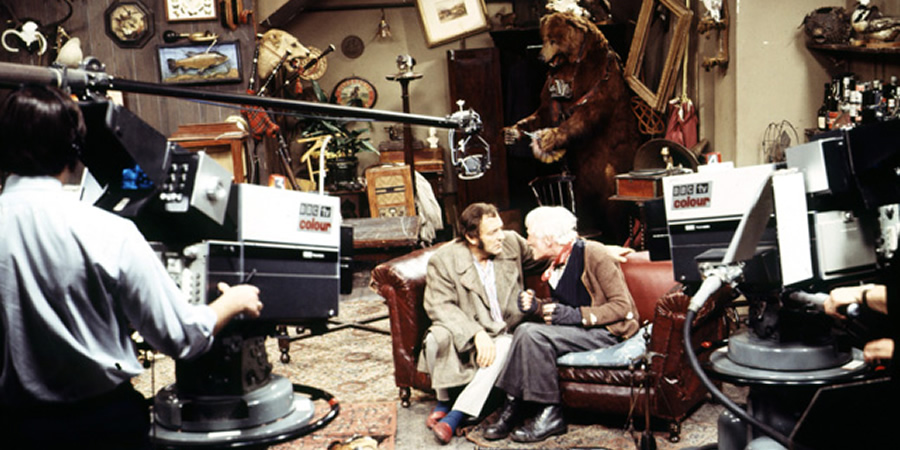
In 1963, for example, on the occasion of them both receiving a Variety Club Award for their performances, they could be seen beaming with delight at each other on the platform, as Brambell, all cow eyes and boyish smiles, spoke of what a 'terrific chap' his colleague (whom he often called his 'playmate') was with which to work, and Corbett in turn patted him on the shoulder and teased him gently with real affection. They might not have been close personal friends, but they were close as co-stars, and were having the time of their lives together.
Some tensions, however, did begin to creep slowly in as the pressure to maintain the show's high standards was cranked up each year by the critics. Brambell, as the senior actor of the two (nicknamed 'Old Neverstop' by others in the profession), remained grateful for the guarantee of regular employment, but Corbett's fear of being typecast for the rest of his career ('Harold is not me', he would protest to fans. 'Harold only exists on paper') led to a growing sense of ambivalence about staying in the sitcom. They were beginning to drift apart, even though, at the time, they were still far too busy to realise it.
When, after a long break, they returned to the show at the start of the 1970s to make four more series, their relationship (though still full of laughs when they had a proper chance to relax) was more obviously under some strain. 'Something', Ray Galton would later say, 'was going sour'.
Brambell's more relaxed approach to his drinking (slugs of gin before breakfast were by now becoming the norm, and he even soaked the Steptoe dentures in Scotch prior to going on set) was sometimes leading to him stumbling over his lines. Corbett, meanwhile, was suffering intermittently from bouts of frustration over what he saw as his thwarted dramatic acting ambitions, and this internal conflict was causing him to coast his way through certain episodes while over-playing one or two other ones.
The writer and producer David Croft (who was working on his own BBC sitcoms at the time) witnessed the imbalance in the dynamic at first hand when he visited the set on a few occasions to watch an episode develop. Brambell, he would recall, 'was a poor study and would fluff and change his lines in a pretty chaotic way. Harry would alter his phrases on the spot and would gather a scene together and hand it back to Wilfrid time after time'.
They could, by this stage, irritate and snap at each other during rehearsals and sometimes even in the studio, and would often sit at opposite ends of the table in the canteen to cool off, but still, more often than not, the mood between them remained broadly cordial. The really serious cracks in their relationship, in fact, would only begin after the long and golden era of Steptoe And Son on television was over.
In the autumn of 1977, three years after the sitcom had last been on the screen (and five years after Corbett had insisted to a reporter that he did not 'intend living in Harold's shoes for ever'), they were invited to tour in a cabaret-style stage show of Steptoe And Son in Australia and New Zealand - countries where the much-repeated sitcom continued to have a huge and enthusiastic following. Neither actor, by this stage, was overly keen on resuming their roles, particularly in a repetitive theatrical format, but, with both of their careers now (by their own past standards) in the doldrums, the money was simply too good to turn down, and so, reluctantly, both men accepted the offer.
It was patently clear, however, when they met up again to work on the script (written, somewhat grudgingly, by Galton and Simpson, and titled Steptoe & Son Down Under), that they were in the wrong kind of mood to make the reunion work anywhere near as well as it could or should have done. Both of them were going back to their past at a time when they wanted to move on to their future.
They were now like an unforgiving mirror to each other. Each saw in the other's face all of the frustration, bitterness and resentment that he now felt at being dragged back into the old partnership, typecast and trapped. It would hardly be surprising, therefore, during the five-and-a-half months of the tour, when there would be days when they preferred to avoid the sight of each other.
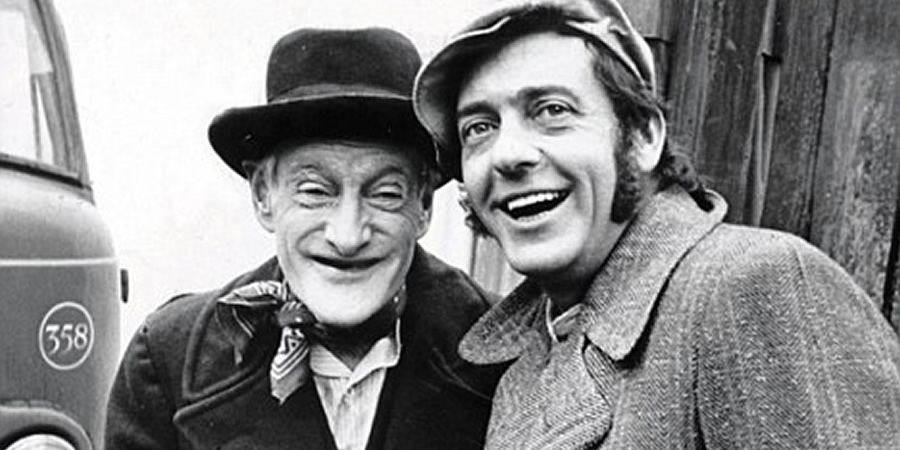
They also, like any long-locked partnership, had that shortcut to each other's nervous system that could trip a wire without even trying. Rather like Neil Simon's great comic drama about an elderly double act, The Sunshine Boys, in which even a simple disagreement as to whether 'Enter' is a better line than 'Come in' sends the two ageing men racing into a temple-throbbing tantrum, Brambell and Corbett knew each other so well - perhaps too well - as performers that even the most trivial tics and traits could sometimes grate.
It was also clear, at least in retrospect, that too little thought had gone into how the two men would cope with such an unusual tour in such unfamiliar circumstances. Corbett was flying in to a country - which he already knew well and loved - with his wife (and later their two young children) for company, making the trip partly a sightseeing vacation as well as work. Brambell, on the other hand, was going to a country about which he knew relatively little, without his long-term partner, Yussof Bin Mat Saman (a much-younger Malayan man to whom he would refer coyly in public as his 'valet'), and was facing long periods alone. It was a sign of the difference in their outlooks, therefore, that while Corbett stepped off the plane in Perth all smiles, Brambell staggered off looking drunk and full of foreboding.
In the beginning, however, the atmosphere between them was excellent. Having been greeted like the much-loved stars that they still were in the eyes of their Australian hosts, they had time to relax in the sunshine and settle in to their new environment, and Brambell even joined Corbett and his family for a couple of short but good-spirited sightseeing expeditions (including visits to Philip Island and the Tantanoola Caves of Mount Gambier).
There would later be mischievous talk that they insisted on always having separate dressing-rooms during the tour because they could not bear to share the same space, but this was always nonsense: they only asked for separate rooms because that was a normal request in the rider for major performers in a production, and it gave each of them some peace and quiet in order to prepare. There would also be claims that they avoided travelling together, which again were blatant cases of mischief-making: as Corbett's daughter, Susannah, makes clear in her biography The Front Legs Of The Cow, the two men did travel together except when the additional presence of Corbett's family meant that it 'would have been a bit of a squeeze' to also accommodate Brambell.
The friction only really began to be felt as the tour went further on. It was a gruelling schedule, particularly for two men who were far from at their fittest (Corbett, at fifty-two, was smoking sixty cigarettes a day, while Brambell, at sixty-five, was a heavy drinker with a red veiny nose that glowed like a recording light), and an uneasy one socially for two actors who were used to meeting up in the studio and then going their separate ways after no more than a few weeks of work.
They were now travelling long distances on a regular basis, and playing eight shows, six days a week, with each performance lasting about fifty to sixty minutes, featuring quite thin comic material padded out with lazy old gags ('I said, "Could I have a deodorant, please?" and she said "Too right you can!" She said "Do you want the roll-on ball type?" I said, "No, No, it's for under me arms!"') and singalong ex-pat songs such as Maybe It's Because I'm A Londoner. The audiences loved it, but the two actors, remembering the heady days when they were dominating the ratings back home in Britain like the sitcom equivalent of The Beatles, often found it somewhat depressing.
During the day, mainly to block out the memory of the show the evening before, Corbett would usually go off and lose himself by looking at the local sights, while Brambell would either stay locked away in his hotel room drinking a whole bottle - at least - of Gordon's gin, or, when in a brighter mood, cruise such places as the esplanade at Surfer's Paradise with a few new-found friends, sometimes sporting a feather boa. By this stage, they understood implicitly that it was best if they limited the time that they shared together.
Gradually, however, their nerves started to fray in each other's company. On one occasion, for example, Brambell, while in one of his increasingly frequent dark and drink-fuelled moods, lashed out at Corbett for no apparent reason other than the fact that he was enjoying being with his family - 'You and your fucking kids!' his old friend snarled in front of them all. Corbett was so angered that (in an eerie echo of how Harold would respond aggressively to Albert) he walked over and gripped Brambell with both hands by the collar, drew him close, looked him in the eyes and said slowly and firmly, 'Never my children'. The next day, they acted as if the incident had never happened, and even shared a joke or two over lunch, but the clash was one sign that a shadow was starting to fall over the tour.
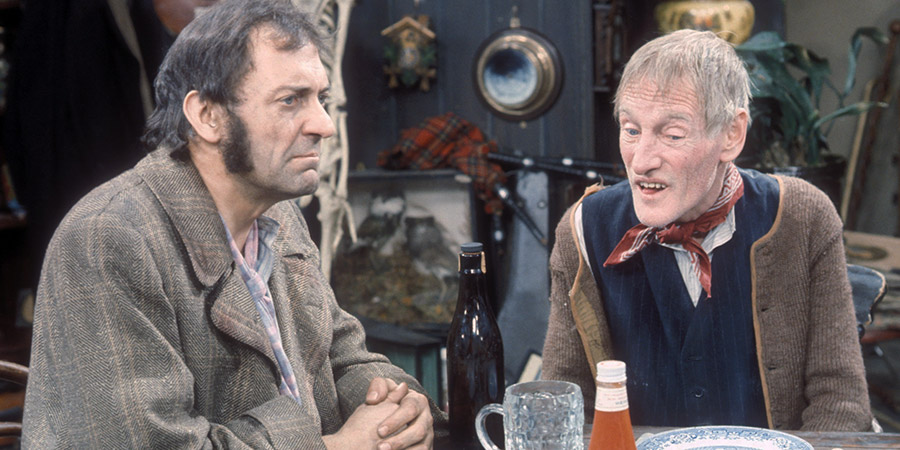
Another such sign arrived during a routine promotional event. One of their joint chores called for them to meet the fans and sign some autographs after a performance, but even these ostensibly pleasant and undemanding affairs would sometimes end up being tarnished by Brambell's boozy boorishness. While Corbett would get on with the job, hiding his tiredness behind a charming smile, Brambell, who was clearly feeling increasingly homesick and lonely as the tour went on, would not even pretend to enjoy these brief PR sessions.
On one night, for instance, he responded to an elderly woman's polite request for a signature by snapping, 'Piss off!' When the tour manager, Kevin O'Neill, stepped in to remind the actor of his manners as well as his duties, Brambell reluctantly reached for her autograph book and said abruptly, 'Got a pen?' When the somewhat flustered woman, looking into her handbag and realising that she had mislaid it, confessed, 'Oh, I'm sorry, Mr Brambell, I haven't', he glowered at her and muttered, 'What do you expect me to sign it with, then - my prick?'
Corbett was so embarrassed and appalled at the behaviour of his co-star, with his increasingly public drunkenness and surliness in the presence of fans, that he flatly refused to accept any further responsibility for his various misdemeanours, and it was left to Corbett's wife, Maureen, to assume the often-thankless task of trying to keep Brambell alert, on time and under control. 'If Wilfrid hadn't had a terribly good night', she later recalled, 'he used to bite everybody's head off. So they used to send me along and I'd knock on the door - "Oh right, darling, I'll be with you in a minute". One day we thought he was having a heart attack; in fact, it was too many gins.'
It was all so depressingly ironic, because Brambell, when Steptoe was at its peak, had often made a point of declaring proudly that '"H" and I work together rather than fight against each other'. Now he seemed intent on inverting that statement.
Sometimes, when the rows between the two men had been particularly fierce, one or the other (but usually Brambell) would retaliate with childish acts of sabotage. One night, for instance, a heavily-perspiring Corbett was left to improvise the show all on his own, after Brambell, without any warning, failed to turn up. He was eventually found by their highly-stressed tour manager round the other side of the block, in the house of a theatre usher he had befriended, sitting down with the rest of the family to a roast beef dinner, still in his stage clothes, and adamant that he would not work that evening.
On another occasion he risked badly injuring a middle-aged woman from the audience who was trying drunkenly to climb on to the stage: Brambell, not missing a beat mid-speech, simply booted her back down into the stalls, where she hit the floor heavily and was lucky not to have broken some bones. When gripped by a black mood such as this he simply no longer cared what anyone thought about him - and that included his long-suffering co-star.
By far the worst moment of all came in Christchurch, New Zealand, in March 1978, when Brambell risked deportation by causing offence to the entire nation. The Steptoe show, by this stage, had been shortened to better suit the waning energy of its two stars, with a local cabaret singer added as a warm-up act to fill-out the allotted time, but this had the unintended consequence of making the audience impatient for the arrival of the two stars and then resentful of the brevity of their belated appearance. A live promotional radio interview the following morning might have improved the mood for subsequent performances, but a badly-hungover Brambell proceeded to make things far, far, worse.
Arriving alongside Corbett, he was in the foulest mood of the entire tour. It might, perhaps, have had something to do with the fact that it had been a New Zealander who had wrecked his one and only marriage (and with it his only likely chance of living an ostensibly conventional life). It might have had something to do with his suspicion that New Zealand, in terms of exposure, was going to be a trivial tour compared to that of Australia. It might simply have been down to the cumulative effects of months of heavy drinking and a draining performing schedule. What was soon beyond doubt, however, was that Wilfrid Brambell was ready to snap.
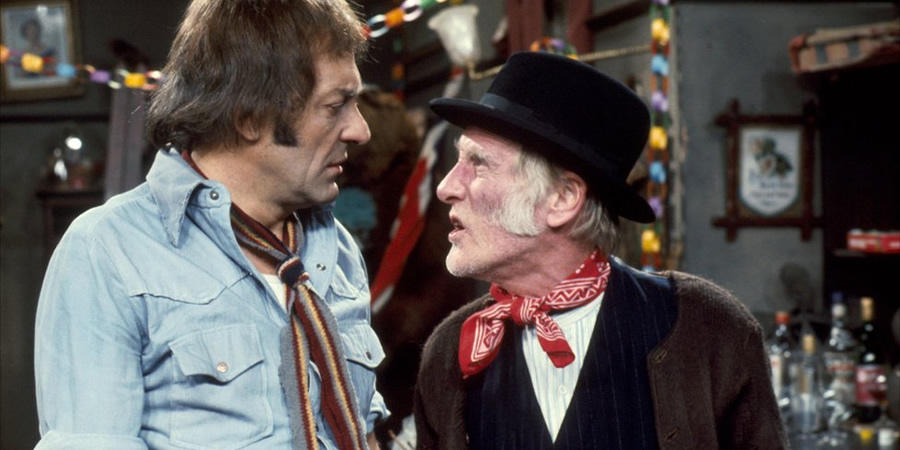
The smiling radio host welcomed the pair into the hot and claustrophobic little studio, and, once the latest commercial break was completed, the segment began. While Corbett responded gamely to an opening question inviting him to wax lyrical about the appeal of the landscape and local architecture (and he genuinely thought the country was one of the most beautiful places he had ever visited), Brambell sat blank-faced and heavy-lidded in silence. The older man was then asked the same question, and, suddenly looking up, replied: 'I hate your fucking cathedrals, and I hate your fucking town, and it's the lowest place I've been in all my life'.
The startled producer immediately killed the microphones, the presenter sat frozen in horror, Corbett looked mortified and Brambell just looked miserable. As chaos ensued, the telephones started ringing, the local police prepared to race over, outraged politicians began to make contact and the actors and their mini-entourage were promptly thrown out of the building. Fleeing the scene as quickly as they could, they left the city soon after, and completed the tour in as low-profile a manner as possible before flying straight back to Sydney.
It was there, after taking a few days off to recover from the humiliation of it all, that they packed their bags and prepared to go home. Brambell, who had now sobered-up enough to feel deeply remorseful for how he had behaved, apologised repeatedly to Corbett (whose anger had, by now, begun to dissipate), and presented his wife with a large and expensive opal as a thank you gift for all the support she had given him.
Amazingly, in spite of all the trouble he had caused, the pair parted fairly amicably. They flew off on separate planes, and, although they did so only because Corbett and his family were heading straight back to London whereas Brambell was bound for a much-needed recuperative stay in the Far East, it is probably fair to say that the bifurcation came as a merciful relief. Both men badly needed some time apart.
A few months later, however, back in Britain inside his elegant apartment in Pimlico, Brambell, in a remarkable act of bravado, gave an upbeat interview to a London newspaper. He sat there, sipping a large gin and tonic, putting what he hoped was (in his eyes at least) a positive spin on what he described as 'the worst tour in the world' by depicting it as a personal feat of perseverance: 'People said I'd never stay the course', he recalled. 'They thought I would opt out or drop dead, but we finished it.'
Even more astonishingly, given how little time there had been for the emotional wounds to heal, Corbett agreed in May 1978 to work with Brambell again on a short one-off BBC radio Steptoe And Son sketch, called Scotch On The Rocks, written by Galton and Simpson in anticipation of the Scotland football team's imminent participation in the 1978 World Cup. Able to escape from each other swiftly after rehearsals and the subsequent recording, it was a far more good-natured experience for both of them, and, it seemed at the time, a much better end to their professional partnership.
As had happened so often in the past, however, fate conspired to stop them from drifting too far away from each other. In 1981, two years after Corbett had suffered a major heart attack, he and Brambell accepted a lucrative offer to appear yet again as Steptoe and Son in, of all things, a television commercial, again specially written by Galton and Simpson, for Kenco coffee (HAROLD: 'I brought Abigail home for a bit of a quick demitasse'. ALBERT: 'You dirty little devil!'). It brought them so much exposure, on a daily basis, and it worked so well, that the tabloids soon began speculating that there might be another Steptoe series, and, in spite of all the negative things that had happened four years before, they were even asked back to Australia for another long concert tour.
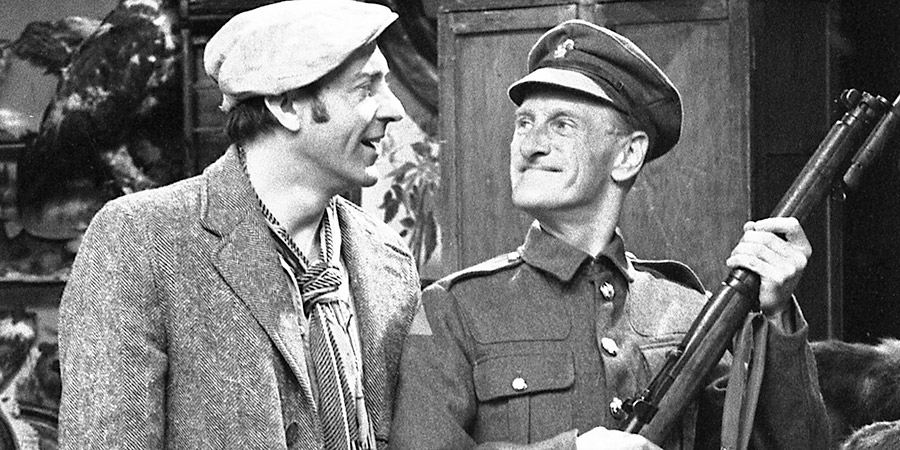
Both men, this time with barely any hesitation, accepted. For all of their lingering differences, it seemed that the world would never fully set them free from each other, and by now both of them seemed resigned to that fact.
The only thing that finally broke the partnership up was their own mortality. On 21st March 1982, a few months before the duo were due to fly off on tour, Harry H. Corbett, at the age of fifty-seven, suffered a fatal heart attack. It was the day before Wilfrid Brambell's sixty-ninth birthday, and, when he heard the news, he burst into tears. Later that afternoon, he spoke to a journalist to pay tribute. 'I am very upset,' he said, before adding, to the surprise of some observers: 'We always got on terribly well together.' He really seemed to mean it.
Brambell would pass away three years later, aged seventy-two, on 18 January 1985, after a short battle with cancer. In stark contrast to Corbett's funeral and subsequent high-profile memorial service at St Paul's in Covent Garden (commonly known as the actors' church), which Brambell himself had attended, his own send-off was a pathetically low-key affair, held on a dark and rainy day at Streatham Park Crematorium, and attended by just six people: his brother, his partner, Galton and Simpson, a representative from the BBC and Maureen Corbett. It was, Alan Simpson would say, 'one of the saddest elements of the whole saga'.
What was arguably even sadder was how the memory of Brambell and Corbett's partnership continued, in their absence, to be manipulated and misrepresented. Newspaper articles, TV documentaries and even the dreaded 'docu-dramas' have all (in some cases quite knowingly) added more and more layers of misinformation, reducing a complex friendship to a simplistic feud. What a shame that some, even now, seem to prefer the fictions to the facts.
Help us publish more great content by becoming a BCG Supporter. You'll be backing our mission to champion, celebrate and promote British comedy in all its forms: past, present and future.
We understand times are tough, but if you believe in the power of laughter we'd be honoured to have you join us. Advertising doesn't cover our costs, so every single donation matters and is put to good use. Thank you.
Love comedy? Find out moreThe Complete Steptoe & Son

The classic 1960s British comedy series about a middle aged man and his elderly father who run an unsuccessful 'rag and bone' business. Harold (the son) wants to better himself but his father always seems to ruin things, sometimes accidentally and other times deliberately.
First released: Monday 29th October 2007
- Distributor: 2 Entertain
- Region: 2
- Discs: 13
- Catalogue: BBCDVD2255
![]() Buy and sell old and new items
Buy and sell old and new items
Search for this product on eBay
BCG may earn commission on sales generated through the links above.
- Released: Monday 31st October 2011
- Distributor: 2 Entertain
- Region: 2
- Discs: 13
- Catalogue: BBCDVD3570
![]() Buy and sell old and new items
Buy and sell old and new items
Search for this product on eBay
BCG may earn commission on sales generated through the links above.

